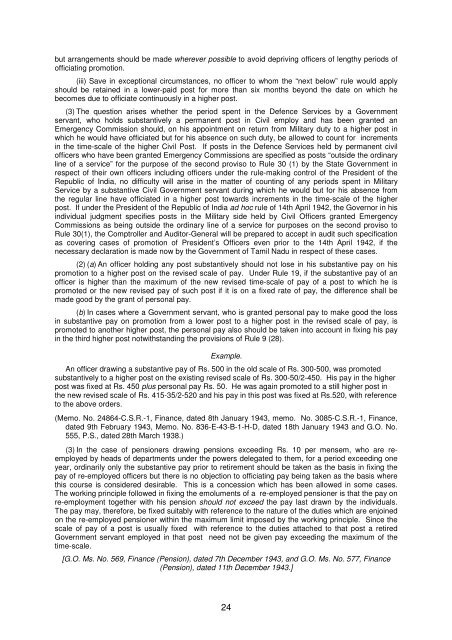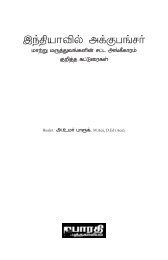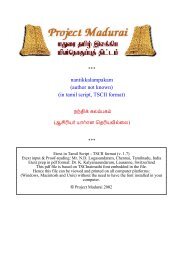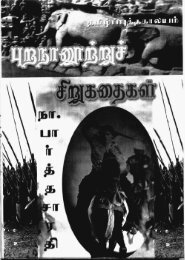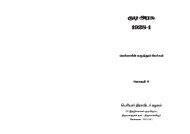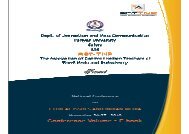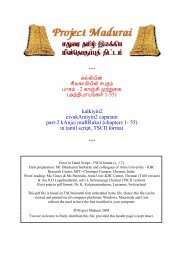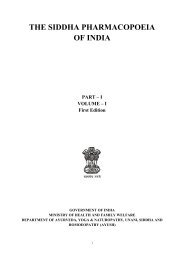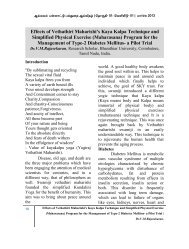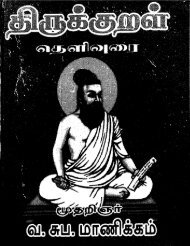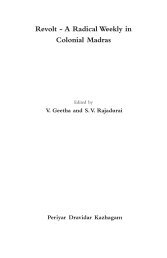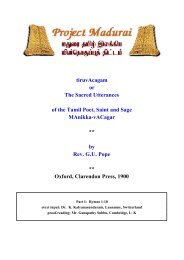THE FUNDAMENTAL RULES OF THE TAMIL NADU GOVERNMENT
THE FUNDAMENTAL RULES OF THE TAMIL NADU GOVERNMENT
THE FUNDAMENTAL RULES OF THE TAMIL NADU GOVERNMENT
- No tags were found...
You also want an ePaper? Increase the reach of your titles
YUMPU automatically turns print PDFs into web optimized ePapers that Google loves.
ut arrangements should be made wherever possible to avoid depriving officers of lengthy periods ofofficiating promotion.(iii) Save in exceptional circumstances, no officer to whom the “next below” rule would applyshould be retained in a lower-paid post for more than six months beyond the date on which hebecomes due to officiate continuously in a higher post.(3) The question arises whether the period spent in the Defence Services by a Governmentservant, who holds substantively a permanent post in Civil employ and has been granted anEmergency Commission should, on his appointment on return from Military duty to a higher post inwhich he would have officiated but for his absence on such duty, be allowed to count for incrementsin the time-scale of the higher Civil Post. If posts in the Defence Services held by permanent civilofficers who have been granted Emergency Commissions are specified as posts “outside the ordinaryline of a service” for the purpose of the second proviso to Rule 30 (1) by the State Government inrespect of their own officers including officers under the rule-making control of the President of theRepublic of India, no difficulty will arise in the matter of counting of any periods spent in MilitaryService by a substantive Civil Government servant during which he would but for his absence fromthe regular line have officiated in a higher post towards increments in the time-scale of the higherpost. If under the President of the Republic of India ad hoc rule of 14th April 1942, the Governor in hisindividual judgment specifies posts in the Military side held by Civil Officers granted EmergencyCommissions as being outside the ordinary line of a service for purposes on the second proviso toRule 30(1), the Comptroller and Auditor-General will be prepared to accept in audit such specificationas covering cases of promotion of President’s Officers even prior to the 14th April 1942, if thenecessary declaration is made now by the Government of Tamil Nadu in respect of these cases.(2) (a) An officer holding any post substantively should not lose in his substantive pay on hispromotion to a higher post on the revised scale of pay. Under Rule 19, if the substantive pay of anofficer is higher than the maximum of the new revised time-scale of pay of a post to which he ispromoted or the new revised pay of such post if it is on a fixed rate of pay, the difference shall bemade good by the grant of personal pay.(b) In cases where a Government servant, who is granted personal pay to make good the lossin substantive pay on promotion from a lower post to a higher post in the revised scale of pay, ispromoted to another higher post, the personal pay also should be taken into account in fixing his payin the third higher post notwithstanding the provisions of Rule 9 (28).Example.An officer drawing a substantive pay of Rs. 500 in the old scale of Rs. 300-500, was promotedsubstantively to a higher post on the existing revised scale of Rs. 300-50/2-450. His pay in the higherpost was fixed at Rs. 450 plus personal pay Rs. 50. He was again promoted to a still higher post inthe new revised scale of Rs. 415-35/2-520 and his pay in this post was fixed at Rs.520, with referenceto the above orders.(Memo. No. 24864-C.S.R.-1, Finance, dated 8th January 1943, memo. No. 3085-C.S.R.-1, Finance,dated 9th February 1943, Memo. No. 836-E-43-B-1-H-D, dated 18th January 1943 and G.O. No.555, P.S., dated 28th March 1938.)(3) In the case of pensioners drawing pensions exceeding Rs. 10 per mensem, who are reemployedby heads of departments under the powers delegated to them, for a period exceeding oneyear, ordinarily only the substantive pay prior to retirement should be taken as the basis in fixing thepay of re-employed officers but there is no objection to officiating pay being taken as the basis wherethis course is considered desirable. This is a concession which has been allowed in some cases.The working principle followed in fixing the emoluments of a re-employed pensioner is that the pay onre-employment together with his pension should not exceed the pay last drawn by the individuals.The pay may, therefore, be fixed suitably with reference to the nature of the duties which are enjoinedon the re-employed pensioner within the maximum limit imposed by the working principle. Since thescale of pay of a post is usually fixed with reference to the duties attached to that post a retiredGovernment servant employed in that post need not be given pay exceeding the maximum of thetime-scale.[G.O. Ms. No. 569, Finance (Pension), dated 7th December 1943, and G.O. Ms. No. 577, Finance(Pension), dated 11th December 1943.]24


